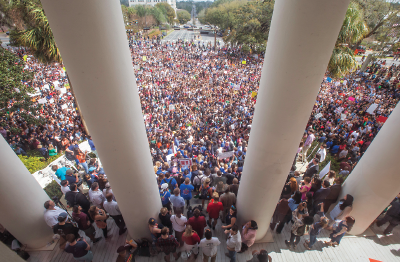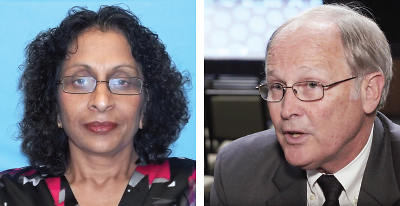Psychiatrists Help Florida Shooting Victims Push for Meaningful Change
Abstract
APA members are working to ensure victims’ needs are met after the latest mass shooting and meet with state officials to help prevent similar tragedies.
Psychiatrists in Florida were quick to support victims’ needs after a mass school shooting last month that resulted in the deaths of 17 students and adults, while many closest to the tragedy are demanding action to prevent more bloodshed.

Days after the shooting in Parkland, Fla., students from Marjory Stoneman Douglas High School held a rally at Florida’s state capitol in Tallahassee to demand that lawmakers pass stricter gun-control legislation. “Never again” and “Vote them out,” they chanted.
“Leaders in child psychiatry, especially in child trauma, have reached out to Florida psychiatrists who live and work in that area to offer their support,” R. Scott Benson M.D., a child and adolescent psychiatrist in Pensacola, Fla., and a member of APA’s political action committee (APAPAC), told Psychiatric News.
“The agencies that we work with have partnered with the school board to provide immediate crisis counseling,” Bhagi Sahasranaman, M.D., a child psychiatrist in Broward County, told Psychiatric News in the aftermath of the shooting.
Benson and Sahasranaman were part of a Florida mental health and child welfare work group that was pulled together six days after the shooting. Attendees discussed ways to expand mental health services and intervene with families who frequently call law enforcement to handle domestic violence. Afterward, the two psychiatrists were part of a smaller group that met with Gov. Richard L. Scott. “Overall, I felt like it was a really positive meeting, although I wish bigger steps could have come out of it,” Benson said.
Following the meeting, Scott proposed barring gun purchase and possession for individuals with mental illness, a $450 million investment to improve school security, and $50 million in funding for mental health initiatives, including requiring all schools to have counselors and crisis intervention teams. As part of the plan, he also is vowing to create a “violent threat restraining order” that would allow Florida courts to confiscate firearms from individuals who threaten violence involving weapons. The state’s legislature had just two weeks left in this session to pass legislation as of press time.
The governor’s plan also includes increasing the legal age to purchase all firearms to 21 years old (currently it is 18 years old for rifles and shotguns) and banning bump stocks, devices that boost firearm firing speed. Florida has some of the least restrictive firearm laws in the nation, according to the Giffords Law Center to Prevent Gun Violence, which rated it an “F.” However, even if the measure passes, youth of any age could still possess rifles, such as an AR-15, and other long guns.
If Florida’s gun restrictions pass, it would be the first time in more than a decade that lawmakers there advance any legislation opposed by the NRA, according to the Tampa Bay Times.
What Happened at Stoneman Douglas
Parkland, a small city with a million-dollar median home value and park-like design, was voted Florida’s safest city in 2017. Its Marjory Stoneman Douglas High School has been an A-rated school for the past seven years by the Florida Department of Education. The school had diligently run safety drills and had established a single point of entry for the sprawling campus of 3,300 students. It even had an armed security guard on duty at the time of the shooting. “This shouldn’t be happening here,” said Sahasranaman, who lives just a few miles from the school.
And yet near the end of the school day on February 14—Valentine’s Day—a former student who had been expelled for disciplinary reasons pulled a fire alarm and picked his way through one of its buildings with an AR-15 semiautomatic rifle, killing 14 students and three faculty members and inujring 14 before casually walking out and heading to a Subway inside a Walmart to buy a drink. He confessed after the shooting.
The mass shooting’s effect on the community has been profound, with sadness, numbing anger, and intense anxiety, Sahasranaman said. She helped facilitate a psychiatric referral for one student who survived the tragic events at the school that day and needed a higher level of intervention. “Right now, everyone is in shock, dealing with the immediate situation,” she explained. “The counseling will be more critical, and victims’ needs will increase as time goes on.”
After the shooting, Sahasranaman checked in on a close friend of hers, a math teacher who was in the building at the time, to offer support to her and her husband. The quick thinking by that teacher, “Mrs. V,” saved many lives that day: rather than releasing her students at the sound of the fire alarm—the second one of the day—she realized something wasn’t right and quickly locked the door and instructed students to huddle on the floor, covering her window with paper. “That was terror,” Sahasranaman said. “She’s devastated.”
‘They’re Not Going to Take It’
What has set this mass shooting apart is the unprecedented level of activism by the survivors themselves, who are demanding tightened gun restrictions and for politicians to stop accepting money from the NRA.
“It’s great to see these kids,” Sahasranaman said. “They’re amazing, and they’re not going to take it. They’re rallying against gun violence and demanding gun control. It’s unfathomable that an 18-year-old can buy an assault rifle. They can’t even buy a beer, but they can go and get an AR-15.”
The United States has by far the highest gun ownership of any nation, with civilians owning about 90 guns for every 100 people—270 million firearms overall—according to estimates by Small Arms Survey, a gun research group in Geneva, Switzerland.
APA is calling on President Trump and Congress to take a series of steps that would reduce gun violence with commonsense solutions, increase funding for research on mental illness, and improve access to mental health care.
APA CEO and Medical Director Saul Levin, M.D., M.P.A., pointed out that research has consistently shown that people with mental illness are not more likely to be perpetrators of violence, but more likely to be victims. Moreover, people with serious mental illness commit only about 3 percent of violent crimes each year, according to the 2016 book Gun Violence and Mental Illness from APA Publishing.
Public Health Dimension Needs to Be Addressed

Bhagi Sahasranaman, M.D., and R. Scott Benson, M.D., met with the Florida governor last month to discuss ways to improve mental health services following a mass shooting.
Benson agreed that gun violence must be approached as a public health problem. “The overwhelming majority of mass shootings have been committed by angry young men,” he pointed out. “I don’t have a medicine that can fix them. And locking them all up is not an option. While every society in the world has its share of angry young men, the United States stands alone in its mass shooting toll.”
The United States is home to 5 percent of the world’s population, but accounts for 31 percent of global mass shootings, according to a 2016 study by the University of Alabama. “We can’t prevent hurricanes, earthquakes, or tornadoes, but I believe we can do something to curb this gun violence,” Benson said. “APAPAC should consider a candidate’s position on guns as a factor in their decision to support.”
Ultimately, Benson said that in the aftermath of gun violence, psychiatrists step in to help people in the community heal and regain their footing.
“We help people resolve the trauma. We’re good at that,” he said. “But we’ve had too many of these shootings. We shouldn’t have to deal with these tragedies; nobody should.” ■



